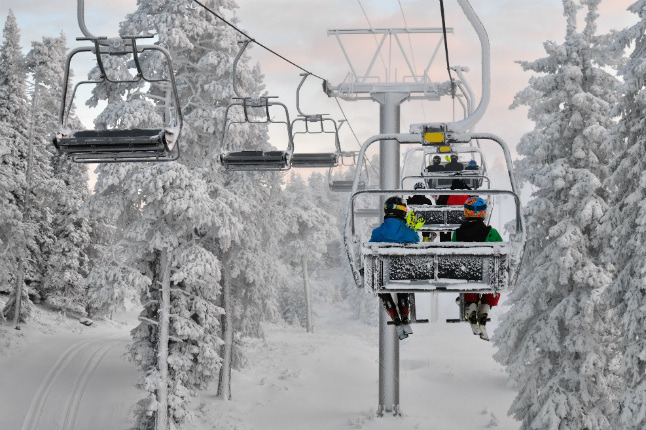Finally, Ski Resorts Battle Climate Change
Despite all that's written about climate change, global efforts to address the unfolding crisis are failing miserably. With greenhouse gas emissions continuing to climb and atmospheric carbon dioxide concentrations higher than they've been in 3 million years, humanity is flirting with disaster. But now there's evidence that some of those who have the most to lose are stirring.
Last month, eight iconic ski resorts and a climate-focused nonprofit made the most significant corporate acknowledgment yet of a mortal threat to an important U.S.-Canadian industry. The resorts, including Mammoth Mountain, Squaw Valley/Alpine Meadows, Aspen/Snowmass, Alta, Snowbird and Jackson Hole, which offer a shared lift pass called the Mountain Collective, announced a partnership with the advocacy group Protect Our Winters. Its mission is to create the political will to stop climate change and preserve winter recreation for future generations.
The partnership is a statement that extreme weather is not just a bellwether of climate; it's an imminent threat to livelihoods, and it comes in the wake of growing awareness of economic loss in other industries, including agriculture, fisheries, disaster insurance and tourism. The Mountain Collective has also seen through the political fog and disinformation propagated by climate skeptics funded by fossil-fuel advocates.
Science magazine recently reported that climate change is now happening "orders of magnitude" faster than at any other time in the last 65 million years. Past climate changes that wiped out species and remolded landscapes happened over vast timeframes. But the changes we are seeing, and which are in the system, are happening in decades.
Recently, The New York Times reported on a new University of California, Berkeley, study predicting that the "incidence of war and civil unrest may increase by as much as 56 percent between now and 2050, due to warmer temperatures and extreme rainfall patterns."
Environmental advocates, together with their foundation funders, have done a good job of elevating the issue and drawing up policy solutions in the face of climate denial and furious counter-lobbying in Washington. But why would the business community, faced with an existential threat, wait for the nonprofit or philanthropic community to take the lead?
The Mountain Collective partnership is a statement that companies need to address the climate crisis for economic and business reasons, the arguments that seem to matter most in Washington these days. The unpredictability—and downright undeniable warmth—of the last two winters has been an obvious drag on profits, as snow fails to fall and forest fires ravage the landscape around Western resorts in Idaho and Montana.
But there's another reason to take action: Young people, the industry's future market, care deeply about climate change. A League of Conservation Voters poll showed that "for voters under 35, denying climate change signals a much broader failure of values and leadership."
The other message these companies are sending is that feel-good green marketing initiatives and light-bulb retrofits are yesterday's news. They need to be replaced by political demands for protective climate policy—just as the fossil fuel industry has so often and so effectively demanded a continuation of its drilling rights and subsidies.
The fossil-fuel industry's chant has been, "If you block our refinery/mine/drilling project, how many jobs would we lose?" To which we can now say: "How many jobs and supporting industries will we lose with a ski industry that lacks snow? How many livelihoods are threatened in the oyster industry, which is already seeing runaway climate impacts? Or in lobster fisheries? Or at all of the coastal hotels and golf resorts battered by superstorms and sea-level rise?"
Nationally, more than 23 million people participate in winter sporting activities that add an estimated $12.2 billion to the U.S. economy, through spending at ski resorts, hotels, restaurants, bars, grocery stores and gas stations. In some mountain towns, the entire winter economy is based on skiing.
The looming threat of a changing climate is why, this year at the Mountain Travel Symposium in Colorado, venture capitalist and former Expedia CEO Erik Blachford told resort leaders and travel industry executives: "You guys could do the world a great service by connecting the dots."
The good news for companies that take this step is that customers will admire their stand and reward it with more discerning choices and loyalty. The same is true for employees. Better yet, working together with advocates, the Mountain Collective may succeed where traditional environmental groups have come up short, by helping to achieve meaningful national action on climate.
Auden Schendler is the Vice President of Sustainability at Aspen Skiing Company. He wrote this article in cooperation with Lukas Haynes, the Vice President of Mertz Gilmore Foundation.
–
This story first appeared in High Country News.
